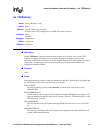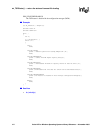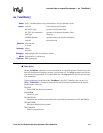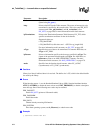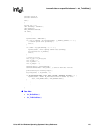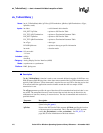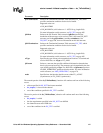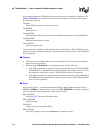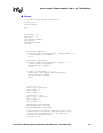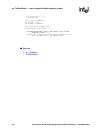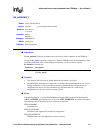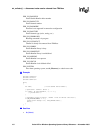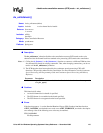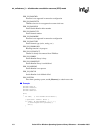
428 Voice API for Windows Operating Systems Library Reference — November 2003
dx_TxRxIottData( ) — start a transmit-initiated reception of data
If the channel detects end of FSK data during the receive portion, the function is terminated. Use
ATDX_TERMMSK( ) to return the reason for the last I/O function termination on the channel.
Possible return values are:
TM_EOD
End of FSK data detected on transmit or receive
TM_ERROR
I/O device error
TM_MAXDATA
Maximum data reached; returned when the last I/O function terminates on DX_MAXDATA
TM_MAXTIME
Maximum function time exceeded
TM_USRSTOP
Function stopped by user
Upon asynchronous completion of the transmit portion of the function, a TDX_TXDATA event is
generated. Upon asynchronous completion of the receive portion of the function, a TDX_RXDATA
event is generated.
!
!!
! Cautions
• Library level data is buffered when it is received. The buffer size is 255, which is the default
buffer size used by the library.
• When using dx_TxRxIottData( ) in asynchronous mode, note the following:
• If the FSK transmission is completed with a termination mask value of TM_MAXTIME,
TM_MAXDATA or TM_EOD, then the channel automatically initiates a receive session.
On completion of the receive session, a TDX_RXDATA event will be generated.
• If the FSK transmission is completed with a termination mask value of TM_USRSTOP or
TM_ERROR, then the channel does not initiate a receive session and the TDX_RXDATA
event will not be generated.
!
!!
! Errors
If the function returns -1, use the Standard Runtime Library (SRL) Standard Attribute function
ATDV_LASTERR( ) to obtain the error code or use ATDV_ERRMSGP( ) to obtain a descriptive
error message. One of the following error codes may be returned:
EDX_BADIOTT
Invalid DX_IOTT (pointer to I/O transfer table)
EDX_BADPARM
Invalid data mode
EDX_BUSY
Channel already executing I/O function
EDX_SYSTEM
Error from operating system; use dx_fileerrno( ) to obtain error value




